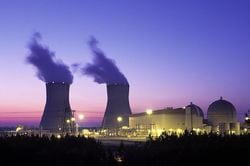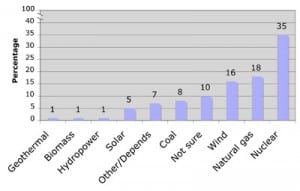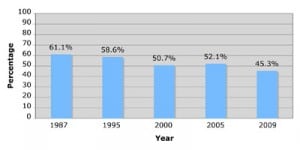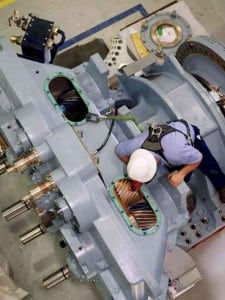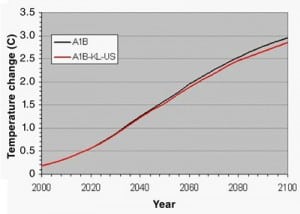In This Issue
-
Legal & Regulatory
TREND: Fire Safety Again Tops Nuclear Agenda
The U.S. Nuclear Regulatory Commission puts fire at the top of its safety concerns, calculating that fire constitutes half of all reactor safety risks, and lately fire safety has again become a major industry issue. For example . . .
-
Commentary
The Politics and Perils of Pork
An "emergency war supplemental" appropriation bill that Congress was considering at this writing has implications for the power industry: The measure includes $9 billion each for new loan guarantees for nuclear power and renewable energy projects.
-
Legal & Regulatory
Regulators Embrace Nuclear—Awkwardly
A recent survey finds utility regulators contradicting themselves on the touchy subject of nuclear power. They say they like new nukes, but their actions belie their stated beliefs.
-
Supply Chains
DOE Helium Shortage Hits Nuke Security, Oil And Gas Industry
The Energy Department’s failure to recognize an impending supply squeeze for helium-3—a nonradioactive gas produced in the agency’s nuclear weapons complex—has created a national crisis requiring White House intervention and threatening key U.S. nuclear and homeland security programs, a wide range of medical and scientific research activities and development of U.S. oil and natural gas resources, according to testimony before a House subcommittee.
-
HR
Wasting Time and Hating the Job
Does wasted work time equal job dissatisfaction? Two studies point in that direction.
-
HR
How Clipper Windpower Jump-Started Itself . . . Big Time
Clipper Windpower didn’t have the luxury of a decade or more of product development. Instead, it started big—with a 2.5-MW wind turbine. Here’s the story of how they did it.
-
Finance
Bid Smartly . . . or Walk Away
With some industries reeling in today’s economy, future revenue growth is still uncertain in certain markets. The bright exception is the "new energy" arena of renewables and sustainables. But that’s a tough market, with lots of competitors for the business and lots of opportunities to misfire and miss the boat. A key to success is bidding smartly on contract opportunities. Otherwise, don’t bid at all.
-
Commentary
Kerry-Lieberman Trade in the Trivial
The recently unveiled Kerry-Lieberman global climate warming bill is an exercise in triviality. By century’s end, reducing U.S. greenhouse gas emissions by 83% will only result in global temperatures being one-fifth of one degree Fahrenheit less than they would otherwise be. That is a scientifically meaningless reduction.
-
Commentary
Cape Wind: Never Again
Cape Wind was a momentous clean energy victory, but if climate change advocates truly take the immense scale of the energy and climate challenge seriously, we must ensure that this is the last time that a new zero-carbon energy source faces such prolonged NIMBY opposition
-
Commentary
Econ Boffins: Scrap CO2 Emissions Reductions
A group of 14 international academics from a variety of fields, under the auspices of the London School of Economics and Politics, have produced a paper calling for a new approach to the failed Kyoto Protocol model for dealing with global warming, scrapping the notion of emissions reductions.


